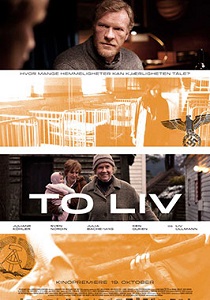 For Americans, the bulk of what we know about German history, at least as it pertains to the viable parameters of cinema, boils down to about six years when a once-in-a-lifetime prick with a bad mustache had the world on edge. This is somewhat understandable, for filmmakers love a good villain, and there are fewer groups more universally reviled than the Nazis. Yet if one looks a bit closer, they might find a treasure trove of movies made outside of the Hollywood cabal: films less interested with World War II, and far more concerned with the way Germans went on with their lives after that conflagration.
For Americans, the bulk of what we know about German history, at least as it pertains to the viable parameters of cinema, boils down to about six years when a once-in-a-lifetime prick with a bad mustache had the world on edge. This is somewhat understandable, for filmmakers love a good villain, and there are fewer groups more universally reviled than the Nazis. Yet if one looks a bit closer, they might find a treasure trove of movies made outside of the Hollywood cabal: films less interested with World War II, and far more concerned with the way Germans went on with their lives after that conflagration.
Two Lives (Zwei Leben) is just such a film, for its setting, characters, themes, and texture all speak to a healing and grieving process that is still going on in Germany to this day, and it’s got little to do with jackboots an swastikas. The picture is set in 1990, and in it Juliane Köhler plays Katrine, a newly minted grandmother in her mid-50’s that seems to be enjoying the domestic trivialities of her suburban Norwegian life. The woman’s clearly got something going on besides her artsy day job and diaper-changing hobby, however, for the film opens with her sliding through a German airport in disguise, and on some kind of clandestine mission to recover wartime information.
Thus begins the enthralling and often taut journey of Two Lives, a film about not just a woman, but an entire European community attempting to heal and make peace with the wounds of its post-WWII past. Set during the months just after the reunification of East and West Germany, Katrine’s idyllic home-life is startled out of place by the presence of an attorney, Sven (Ken Duken). Sven represents a group of plaintiffs who have brought a class-action suit against the German and Norwegian governments for their complicity in a ghastly wartime program. During WWII, the Nazi regime forcefully “adopted” scores of Norwegian children whose fathers could be identified as German soldiers/personnel. Taken to Germany during the conflict, these “Lebensborn” children were given new identities and families after the war, and largely assimilated into East German society.
 That is, except for Katrine; Katrine is the only Lebensborn child to have successfully escaped East Germany and reconnected with their true Norwegian mother. Sven comes to her early in the picture to let Katrine know that her testimony in the European Court hearings judging the Lebensborn suit would carry significant weight. Katrine’s husband, daughter, and mother all seem willing to help Sven and his case, yet the star witness seems oddly reticent, and even threatened by this sudden intrusion.
That is, except for Katrine; Katrine is the only Lebensborn child to have successfully escaped East Germany and reconnected with their true Norwegian mother. Sven comes to her early in the picture to let Katrine know that her testimony in the European Court hearings judging the Lebensborn suit would carry significant weight. Katrine’s husband, daughter, and mother all seem willing to help Sven and his case, yet the star witness seems oddly reticent, and even threatened by this sudden intrusion.
As Two Lives delves deeper and deeper into Katrine’s past, and the story behind her arrival in Norway over twenty years before, the audience gets drawn further into the sordid past of a woman and a country that are both struggling with the dramatic political changes taking place in Europe during the fall of the GDR (East Germany’s government). Although the particulars of exactly what is (and was) going on with Katrine is delicately unfolded throughout the course of the film, her curious movements and interactions with the Stasi (East Germany’s Secret Service apparatus) hint at something fishy from the get-go.
 Back in 1990, with the Berlin Wall down and the Cold War wrapping up, a lot of information was coming out about who did what, and for whom during the post-war years; although Katrine’s role in all this isn’t exactly clear, Sven’s has clearly put a bee in the woman’s bonnet. Part of this movie’s quality comes from the patient approach director Georg Maas takes with his story, for the journey of discovering exactly what happened to Katrine and her role in the Lebensborn affair is gripping. It’s a fascinating story, and one that is complex enough to keep a person guessing, yet plausible to the point of total engagement.
Back in 1990, with the Berlin Wall down and the Cold War wrapping up, a lot of information was coming out about who did what, and for whom during the post-war years; although Katrine’s role in all this isn’t exactly clear, Sven’s has clearly put a bee in the woman’s bonnet. Part of this movie’s quality comes from the patient approach director Georg Maas takes with his story, for the journey of discovering exactly what happened to Katrine and her role in the Lebensborn affair is gripping. It’s a fascinating story, and one that is complex enough to keep a person guessing, yet plausible to the point of total engagement.
The work Juliane Köhler does in this picture makes up another large component of this film’s success, for the actress must balance the deception and misdirection of decades in multiple scenes where she has to juggle several wildly different emotional ranges. A strong supporting performance is also turned in by Sven Nordin as Bjrte, Katrine’s husband, who has a fairly thankless role in the script, yet brings an amazing amount of depth and tenderness to it. As mentioned earlier, this isn’t just a film about one woman’s journey, or even one country’s, for Katrine’s life and actions affect everyone around her, just as Germany’s post-war past stained the domestic fabric of any number of neighboring countries, such as Norway.
 And speaking of Norway, a moment should be set aside to touch on the visual aesthetic of Two Lives, which practically introduces another main character in the Scandinavian setting. The delicate splendor of the Norwegian landscape fits the tone of the film well, for there’s an underlying danger to the beauty of that land: one where the gorgeous lakes give a person hypothermia, and one false step on a nearby mountain can bring about instant death. This seems to be the kind of world Katrine lives in, and as tightly wound as this story is, the film frequently takes a moment to pan around the thick Norwegian wilderness to remind the audience of this.
And speaking of Norway, a moment should be set aside to touch on the visual aesthetic of Two Lives, which practically introduces another main character in the Scandinavian setting. The delicate splendor of the Norwegian landscape fits the tone of the film well, for there’s an underlying danger to the beauty of that land: one where the gorgeous lakes give a person hypothermia, and one false step on a nearby mountain can bring about instant death. This seems to be the kind of world Katrine lives in, and as tightly wound as this story is, the film frequently takes a moment to pan around the thick Norwegian wilderness to remind the audience of this.
Currently playing at this year’s Seattle International Film Festival, Two Lives is a movie worth seeing both because of the quality of the story it endeavors to tell, but also for the way it tells it. A fictional drama whose particulars seem entirely plausible to those who have studied the history of German reunification following 1990, this one is a fascinating “what-if” that sheds some light on a post-WWII Europe most Americans don’t even know existed.





Comments on this entry are closed.